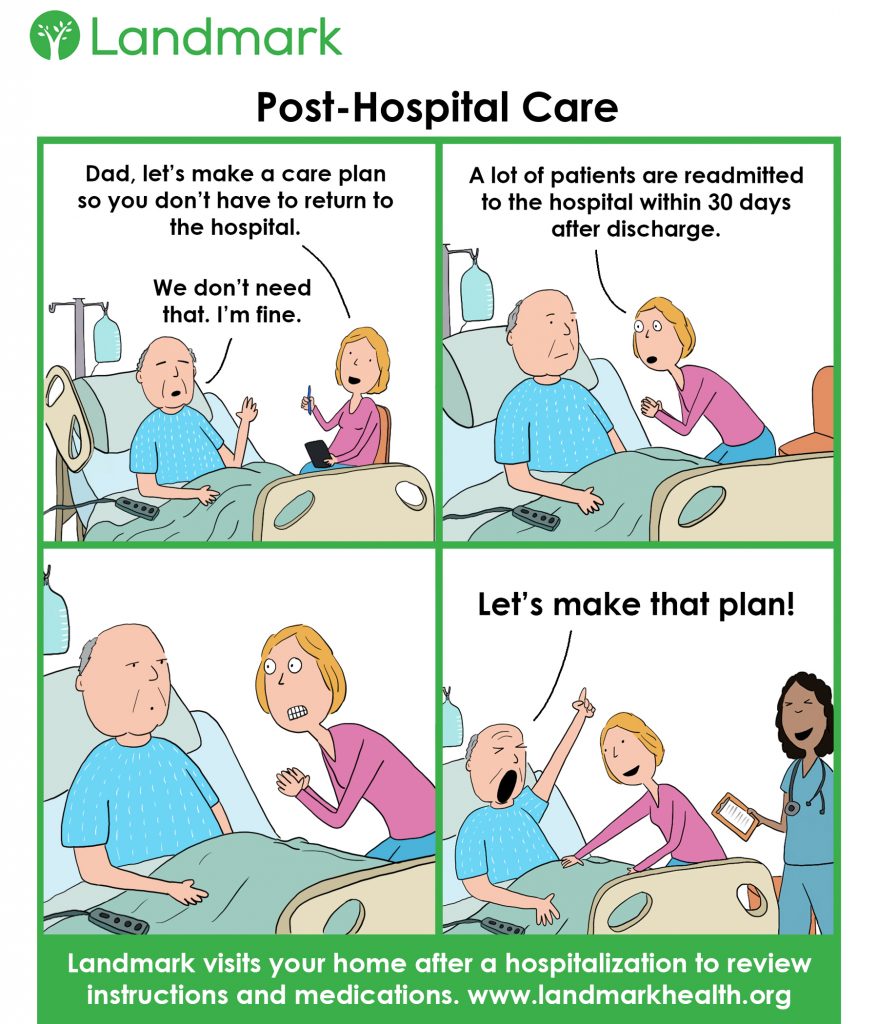
Blog post
Prioritizing Mental Health as a Universal Human Right
By: Neltada Charlemagne, DNP, APRN, PMHNP-BC, PHN, BHC
If you just got out of the hospital, you’re probably feeling like the last thing you want is a visit from your doctor. We get it. You’ve been treated, prodded, and medicated and are ready to be at home and rest. But here’s why it can be important for Landmark to swing by your home to see you after a hospitalization.

Why Landmark Post-hospital Visits Are Important
Coming home from the hospital or another facility can be a challenge. Landmark providers can come to your home to help you with important post-hospital hurdles, such as understanding hospital test results and medication changes, scheduling follow-up appointments, and teaching you the self-care required to stay healthy after a hospitalization.
After a hospital or skilled nursing facility stay, many patients are at risk of being readmitted to the hospital within just the first few weeks of returning home. Landmark helps avoid unnecessary readmissions by visiting patients very soon after they get home.
Readmission Cost to Society
Clinicians have always been interested in reducing hospital readmissions to improve patient care—but the issue has moved more dramatically into the national spotlight due to economic factors. There has been a recognition of the ability to prevent readmissions through more timely, attentive health care delivery. Health care costs continue to rise, incentivizing systems to find innovative ways to better deliver care. The desire to reduce the national cost of readmissions has caused more interest in strengthening coordination across the health care continuum.1
A MedPAC report to Congress showed that 18% of patients fee-for-service Medicare patients are readmitted to the hospital within the first 30 days of discharge. For a patient population with multiple chronic conditions, the rate of readmissions within 30 days of discharge is higher at approximately 26%. This costs the government approximately $15 billion. According the report, over 75% of readmissions are preventable. Methods to reduce the rate of readmissions include enhancing the discharge process, improving the patient’s transition out of the hospital, and adding to the care provided to the patient after discharge.2
Conditions that Commonly Cause Hospital Readmissions
Improper medication reconciliation can be a major cause of readmission. In other words, patient confusion about changes with existing and new medicines can cause problems that send the patient back to the hospital.
According to a study by the Agency for Research and Quality (AHRQ), certain conditions are more prone to result in a readmission, such as:
Research has shown that patients who are quickly readmitted to the hospital after discharge (within the first eight days) are more likely to be experiencing complications from their original medical condition. Whereas patients readmitted to the hospital later (up to 30 days following discharge) more likely lacked adequate follow-up care – or may have developed a new medical condition.4
It is quite common and expected that the medicines the patient leaves the hospital taking will need adjustment in dosing, monitoring for drug-drug interactions, and/or discontinuation in only the first week.
Landmark is not a visiting nurse or home health service.
Landmark works with visiting nurses and home health aides to provides you with additional, complimentary care. To see a visual representation of the types of in-home care, check out our illustrated visual depicting the different types of in-home care above.
Post-hospital self-care and why it is important.
According to an article by Dr. Leora Horwitz, three important self-care factors should be considered after a hospitalization: knowledge, planning and ability. Dr. Horwitz believe that patients need to know what to do, have a plan for how to do it, and be able to follow through.5
Landmark can assist you in this after hospitalizations, by offering both medical care and supportive services. Landmark providers help patients through life and medical status, including a transition back home from the hospital or other health care facility.
Landmark can help by observing your progress and address any of your medical, social, or mental concerns, and ensure you carry out the hospital discharge plans.
References:

By: Neltada Charlemagne, DNP, APRN, PMHNP-BC, PHN, BHC

Older adults can safeguard themselves from the physical, mental and emotional toll of unexpected medical costs.

Optum Care Network – Monarch has teamed up with Landmark to deliver in-home medical care to members with multiple chronic conditions.